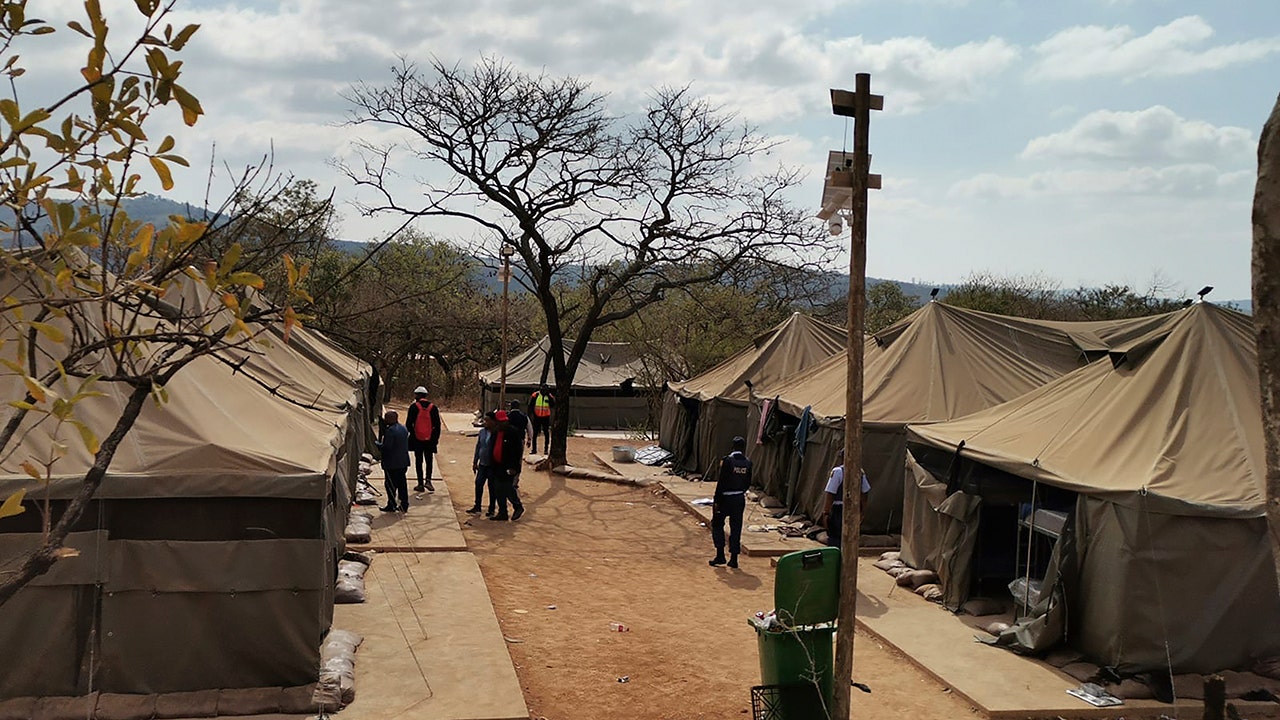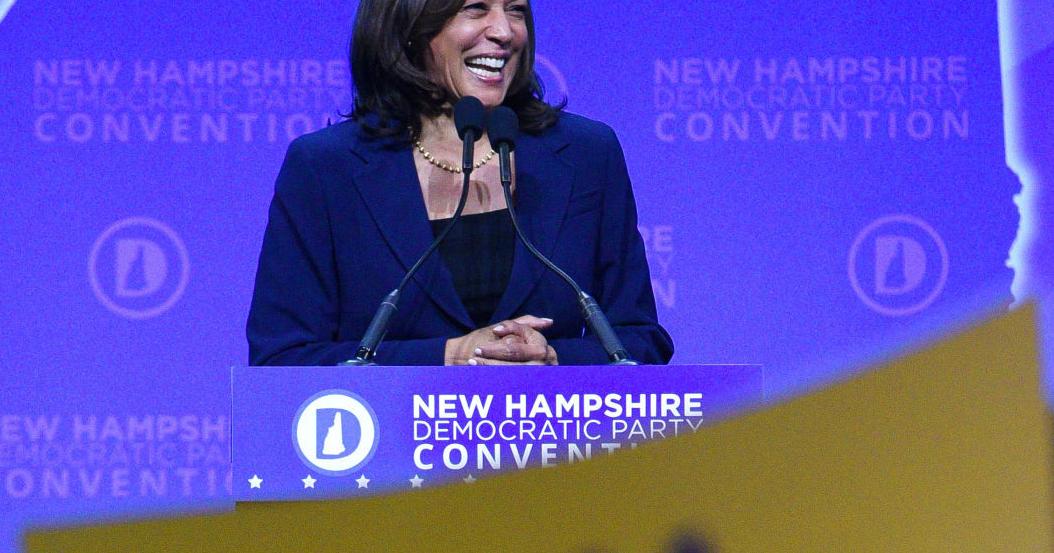World
'Ron, I love that you're back': Trump and DeSantis put an often personal primary fight behind them
DES MOINES, Iowa (AP) — Donald Trump, the presumptive Republican presidential nominee, and Florida Gov. Ron DeSantis are signaling to donors that they are putting their rivalry behind them after a contentious and often personal primary fight.
DeSantis convened his allies this week in Fort Lauderdale, Florida, to press them to raise money to support Trump, making the case over a seafood and steak dinner that they need to work together to prevent Democratic President Joe Biden from winning a second term. The governor and about 30 people then spent Thursday morning in a hotel conference room raising money for an outside group that supports the former president’s 2024 White House campaign.
Trump called into the gathering to thank members of the group for their work, according to four people familiar with the matter who were not authorized to publicly discuss the private session and spoke on condition of anonymity.
In what three people present described as a warm and gracious call to the group that was heard over speakerphone, Trump praised DeSantis and the effort, saying “Ron, I love that you’re back.”
A reconciliation helps both of them. Trump is trying to make up fundraising ground against Biden while DeSantis hopes to preserve a potential future White House run for which Trump’s supporters could be key.
What to know about the 2024 Election
DeSantis and his top donors are raising money for the super political action committee Right for America, backed by big Republican donors such as Ike Perlmutter, who has agreed to match at least a portion of the DeSantis team’s fundraising rather than funneling money directly to Trump’s campaign.
That arrangement, reached after talks between the Trump and DeSantis camps, is designed to address concerns among DeSantis supporters about their money going to pay the former president’s legal bills, according to people familiar with the matter who requested anonymity to discuss the private talks. Trump notably blessed the structure when he called into the group’s meeting Thursday.
“This is where I want you to focus,” Trump said in a roughly 15-minute call, according to a senior political adviser to DeSantis who was not authorized to publicly discuss the private meeting and spoke on condition of anonymity.
DeSantis’ decision to push money to the PAC instead of giving directly to Trump’s campaign has raised eyebrows among some Trump campaign officials, according to a person familiar with the former president’s campaign thinking who spoke on condition of anonymity to discuss the arrangement.
Right for America is competing for donors with MAGA Inc., the chief super PAC backing Trump. Such groups are prohibited from directly coordinating with a presidential campaign, something that hamstrung DeSantis during his presidential run due to conflicts between his campaign and his support of Never Back Down, the largest super PAC backing DeSantis’ candidacy.
Other supporters of both men support the arrangement. Right for America is run by Sergio Gor, a longtime Trump ally who is close to the former president’s eldest son, Donald Trump Jr. The two run Winning Team Publishing, which published two of the former president books.
Some DeSantis donors had been reluctant to give to Trump because they worried their money would help pay Trump’s lawyers in his criminal cases instead of being used directly to focus on beating Biden.
A number of big-name Florida contributors who have given to DeSantis remain hesitant about contributing to efforts to support Trump, said Al Hoffman, a Palm Beach County Republican donor and former Republican National Committee finance chair.
“I know that there are Republican conservative, big-money donors that are very reluctant to endorse Trump,” said Hoffman, who was also chairman of former Florida Gov. Jeb Bush’s 2002 reelection campaign.
DeSantis endorsed Trump when he dropped out of the race and promised in a face-to-face meeting with the former president in April to work for his campaign. The 45-year-old governor, who has won two terms and pushed a longtime swing state increasingly to the right, may run for the White House again and would need the backing of Trump voters in a future Republican primary.
DeSantis called his allies to Fort Lauderdale this week to raise money for Trump, telling them on Wednesday night that they needed to work to prevent a second Biden term.
The meeting was the kickoff for what is expected to be a coast-to-coast fundraising effort by DeSantis allies, with upcoming events likely in Texas, California, Washington state and perhaps New York.
Trump and DeSantis have also discussed a role for the governor at the Republican National Convention. Aides to DeSantis said it was Trump’s suggestion and was not contingent on any fundraising effort on DeSantis’ part.
Donors who discussed the Thursday event were struck by the collegiality between Trump and DeSantis during the call to the meeting. One person who spoke on condition of anonymity about the closed-door gathering called the conversation “very gracious” and noted that Trump and DeSantis talked about golf, a favorite Trump pastime.
___
Associated Press writer Jill Colvin in New York contributed to this report.

World
Celine Dion Makes Triumphant Comeback at Paris Olympics Opening Ceremony — Watch Full Performance

ad
World
95 Libyan nationals arrested in South Africa at suspected secret military training camp

South African police arrested 95 Libyan nationals in a raid on a suspected secret military training camp on Friday and authorities said they were investigating whether there were more illegal bases in other parts of the country.
The camp was discovered at a farm in White River in the Mpumalanga province, about 360 kilometers (220 miles) northeast of Johannesburg, police said.
ELEPHANTS KILL TOURIST IN SOUTH AFRICA AFTER HE TRIED TO GET CLOSE TO TAKE PICTURES
National police spokesperson Athlenda Mathe said in a post on the social media site X that the Libyans stated they had entered the country on study visas to train as security guards, but police investigations suggest they have received military training.
The Newzroom Afrika TV news channel broadcast pictures of the site of the arrests, showing a military-style camp with large green and khaki tents set up in a row. Dozens of men were seen lining up as they were arrested. They were wearing civilian clothing.
Local government official Jackie Macie said investigations were ongoing and the owner of the farm would be questioned. He said authorities received information that there were similar secret camps near two other towns in Mpumalanga province.
A camp where 95 Libyan nationals were arrested on suspicion of running an illegal military camp are seen lining up after their arrest on Friday, July 26, 2024 in White River, South Africa. Police say that 95 Libyan nationals were arrested on suspicion of receiving training at a secret military camp in the north of the country. (AP Photo/Bulelwa Maphanga)
The province borders neighboring countries Mozambique and Swaziland and is an area of concern for South African authorities with regards to illegal immigration.
Police and authorities have not said whether the camps are suspected of being connected to a particular group or conflict.
Macie said investigations would establish if there was a network of camps in South Africa and show “why they are here doing military training in our country.”
Police said the men may be linked to crimes reported in communities close to the farm in recent months.
“We have serious cases which have been opened with the police, including cases of rape and armed robberies, which complainants claim were committed by unknown foreigners who seem to be of Asian descent,” said police spokesman Donald Mdhluli.
“We take what we have found here today very seriously because we don’t know who was training them, what were they being trained for and why that training is happening here in South Africa. It may be a threat not only to South Africa but also to the entire southern Africa region.”
Police said the operation to arrest the Libyans and close down the camp began two days ago. Macie said the Libyan nationals had been in the country since at least April.
“The 95 individuals taken into custody are all Libyan nationals and are currently being questioned by the relevant authorities,” Mpumalanga acting provincial police commissioner Maj. Gen. Zeph Mkhwanazi said in a statement.
Mdhluli, the police spokesman, said the country’s security regulator had confirmed that the kind of training that appears to have been taking place at the camp was well beyond the scope of training for security guards.
“The kind of equipment we found here shows that there was intense military training taking place here. This was basically a military base.”
World
Passengers face long, uncertain wait at stations amid rail disruption

A deliberate fire in a signal box about 60 km south of Lille caused the disruption on the northern high-speed line, with traffic halted around 5 a.m. local time on Friday.
Travel was severely disrupted in Lille on Friday, one of the stations affected by the sabotage that hit major French rail lines ahead of the Paris Olympics opening ceremony.
Many passengers waited with hope that soon turned to resignation.
“We’ve been waiting since 10:38 a.m. for the 11:38 a.m. train, and now we’re just waiting for it to arrive at 2:08 p.m.,” said Delphine, one of the stranded passengers.
“It’s still quite a delay, and we’ll be even later since we’re on a secondary route. I work in Avignon at 9 p.m., so it’s going to be very, very tight. We have a concert tonight — will it even happen? This is all very confusing, and we don’t understand what’s going on.”
For one traveller, this was a rough start to the holidays. “The worst case would be if the train is cancelled entirely and we have to buy new tickets for next week. It would shorten our already brief vacation. That would be a huge problem,” said Hippolyte.
When asked if he had been informed of the delays, Hippolyte said he received the notification just before departure.
“At around 10 a.m. this morning, we were told we were an hour late and would be leaving at 1 p.m.”
“It just keeps getting later as the day goes on. Every time we approach the new departure time, it gets pushed back another hour and a half, or half an hour each time.”
A deliberate fire in a signal box about 60 km south of Lille caused the disruption on the northern high-speed line. Traffic was halted around 5 a.m. on Friday.
The recent acts of sabotage on the rail network highlight that the Olympic Games are turning France into a prime target.
The attack disrupted the transport system on the opening day of the Games, causing delays of up to two hours or even cancellations that affected hundreds of thousands of passengers nationwide.
Authorities in Paris have said they are deploying substantial human resources to counter any threats and to ensure the safety of the events.
-

 World1 week ago
World1 week agoOne dead after car crashes into restaurant in Paris
-

 Midwest1 week ago
Midwest1 week agoMichigan rep posts video response to Stephen Colbert's joke about his RNC speech: 'Touché'
-

 News1 week ago
News1 week agoVideo: Young Republicans on Why Their Party Isn’t Reaching Gen Z (And What They Can Do About It)
-

 Movie Reviews1 week ago
Movie Reviews1 week agoMovie Review: A new generation drives into the storm in rousing ‘Twisters’
-

 News1 week ago
News1 week agoIn Milwaukee, Black Voters Struggle to Find a Home With Either Party
-

 Politics1 week ago
Politics1 week agoFox News Politics: The Call is Coming from Inside the House
-

 News1 week ago
News1 week agoVideo: J.D. Vance Accepts Vice-Presidential Nomination
-

 World1 week ago
World1 week agoTrump to take RNC stage for first speech since assassination attempt


















